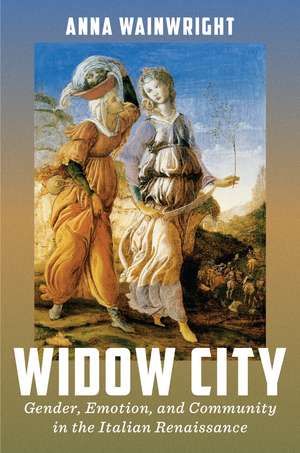Widow City: Gender, Emotion, and Community in the Italian Renaissance: The Early Modern Exchange
Autor Anna Wainwrighten Limba Engleză Paperback – 13 mai 2025
Preț: 336.29 lei
Nou
Puncte Express: 504
Preț estimativ în valută:
64.35€ • 67.32$ • 53.46£
64.35€ • 67.32$ • 53.46£
Carte nepublicată încă
Doresc să fiu notificat când acest titlu va fi disponibil:
Se trimite...
Preluare comenzi: 021 569.72.76
Specificații
ISBN-13: 9781644533598
ISBN-10: 1644533596
Pagini: 216
Ilustrații: 2 color and 2 B-W images
Dimensiuni: 156 x 235 mm
Greutate: 0.45 kg
Editura: University of Delaware Press
Colecția University of Delaware Press
Seria The Early Modern Exchange
ISBN-10: 1644533596
Pagini: 216
Ilustrații: 2 color and 2 B-W images
Dimensiuni: 156 x 235 mm
Greutate: 0.45 kg
Editura: University of Delaware Press
Colecția University of Delaware Press
Seria The Early Modern Exchange
Notă biografică
ANNA WAINWRIGHT is an associate professor of Italian studies and core faculty in women’s and gender studies at the University of New Hampshire. She is coeditor of the volumes Innovation in the Italian Counter-Reformation (Delaware, 2020, with Shannon McHugh), Teaching Race in the European Renaissance: A Classroom Guide (2023, with Matthieu Chapman), and The Legacy of Birgitta of Sweden: Women, Politics and Reform in Renaissance Italy (2023, with Unn Falkeid).
Cuprins
Acknowledgments
Introduction
Part I: Widowhood and the tre corone
Chapter One: Dante, Petrarch, and the Ethics of Widowhood
Chapter Two: Boccaccio’s Many Merry Widows
Part II: Context: Model Widows, Holy and Historical
Chapter Three: Sacred Role Models from Judith and Anna to Birgitta of Sweden
Chapter Four: Dido, Death, and Exemplarity: Public Widowhood from Petrarch to Vittoria Colonna
Part III: The Widow’s Voice
Chapter Five: Widowed Verse: Christine de Pizan, Vittoria Colonna, and Francesca Turina
Chapter Six: “Widowhood for its own sake”: Widows in Two Dialogues of the Counter-Reformation
Epilogue
Notes
Bibliography
Index
Introduction
Part I: Widowhood and the tre corone
Chapter One: Dante, Petrarch, and the Ethics of Widowhood
Chapter Two: Boccaccio’s Many Merry Widows
Part II: Context: Model Widows, Holy and Historical
Chapter Three: Sacred Role Models from Judith and Anna to Birgitta of Sweden
Chapter Four: Dido, Death, and Exemplarity: Public Widowhood from Petrarch to Vittoria Colonna
Part III: The Widow’s Voice
Chapter Five: Widowed Verse: Christine de Pizan, Vittoria Colonna, and Francesca Turina
Chapter Six: “Widowhood for its own sake”: Widows in Two Dialogues of the Counter-Reformation
Epilogue
Notes
Bibliography
Index
Recenzii
"Widow City is an impressive study of the significance of widowhood in Italian Renaissance literature. Through subtle analyses of canonical authors such as Dante, Petrarch, and Boccaccio, who constructed a rich poetic vocabulary around widowhood, to the numerous widowed writers such as Vittoria Colonna and Francesca Turina, who rose to prominence in the sixteenth century and drastically changed the conversation on public mourning, Wainwright singles out the evolution of a remarkably powerful discourse. What she convincingly labels as “poetics of widowhood” becomes nothing but a key to a broad intellectual understanding of literature, community, and civic life in early modern Italy."
In Widow City Anna Wainwright analyzes the evolving role of widow from subject to author in late medieval and early modern Italian literature. Wainwright probes the boundaries of gender in the poetics of widowhood as she moves from the tre corone to the radical reframing performed by Italian Renaissance women authors, many widowed, whose efforts led to a boom in women’s writing unmatched elsewhere in Europe. This book does honor to those women, as Wainwright brilliantly illuminates the story of widows and widowhood in Italian letters.
In Widow City Anna Wainwright analyzes the evolving role of widow from subject to author in late medieval and early modern Italian literature. Wainwright probes the boundaries of gender in the poetics of widowhood as she moves from the tre corone to the radical reframing performed by Italian Renaissance women authors, many widowed, whose efforts led to a boom in women’s writing unmatched elsewhere in Europe. This book does honor to those women, as Wainwright brilliantly illuminates the story of widows and widowhood in Italian letters.
Descriere
Widow City: Gender, Emotion, and Community in Renaissance Italy investigates the evolving role of the widow in medieval and Renaissance Italian literature, from Dante, Petrarch, and Boccaccio, to women poets including Vittoria Colonna and Veronica Gambara, as a key model demonstrating to readers how to mourn and how to live well after devastating loss.
















